Bartosz Luczak/iStock/GettyImages
Before bouillon cubes were invented, home cooks had to make their own broths for soups, sauces and for recipes. This time-consuming process is what sparked the invention of the bouillon cube. While both have similar culinary purposes, there are also distinct differences that can change the result of your recipe.
Understanding Bouillon Cubes
Bouillon cubes are highly concentrated. They're made from a compressed form of broth or stock that is formed into a cube, and may contain preservatives or flavor enhancing additives. You can find bouillon cubes in beef, chicken and seafood flavors in most stores, and you may occasionally see other flavors in specialty stores. Bouillon is also available in quicker-dissolving crystal form, which is the same product but not compressed into cubes. While they're used in recipes that can also use stock or broth, they yield a weaker flavor and are very salty.
The Basics About Broth
A broth is made from simmered meats and vegetables -- typically onions, celery and carrots. Broth is a not a stock; instead it is made from a stock by adding seasonings. You can find frozen broth, but it is more commonly found in cans. Commercially available broth can be unpleasantly high in salt, like bouillon, but you can find low-sodium and fat-free varieties which are more like homemade broth.
Uses for Bouillon and Broth
Typically, bouillon cubes are used in soup and sauce recipes where the cook needs broth quickly. For bouillon, you must first dissolve it in water -- typically, 1 cube per 1 cup of hot water -- before you add it to a recipe. Bouillon is not intended for drinking or eating straight; it is a recipe enhancer. Broth is also a recipe enhancer, but unlike bouillon, you can heat broth and eat it without other ingredients. Broth has a lower sodium content than bouillon and a more concentrated flavor, as well. In most recipes, you can substitute bouillon for broth and vice-versa.
Some Things to Consider
If using bouillon cubes instead of broth in a recipe, cut back the salt in your original recipe. Bouillon cubes are very salty; therefore, they can over salt your dish. You may need more bouillon than stock or broth because of the weakened flavor too. Stock such as meat or vegetable stock, can be used instead of broth or bouillon. Stocks don't have additional seasonings like broth, but they offer a concentrated flavor of meat and vegetables. When using stock, you may need to add additional seasonings or salt.
Related Articles

How to Substitute for a Can of ...
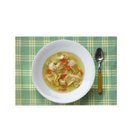
What Are Chicken Granules?

How Long Will Bouillon Cubes Keep?
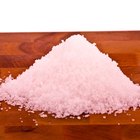
How to Use Sea Salt for Canning

Can You Substitute Beef Bouillon for ...

Difference Between Canned Pumpkin & ...
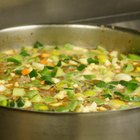
How to Spice Up Chicken Broth
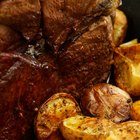
How to Cook a Pot Roast on the Stove Top

What Can Be Used as a Substitute for ...

How to Make Salt Brine

Can I Dilute Whipping Cream to Sub Milk?
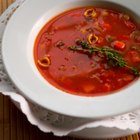
Vegetarian Substitutes for Chicken Broth
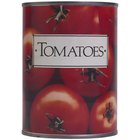
Can I Use Diced Tomatoes Instead of ...

About Fresh Ginger Substitutes

How to Thicken the Stock of Chicken & ...

Do You Use Flour or Corn Starch to ...
Does Deli Roast Beef Contain Nitrates?

Can You Thicken Soup With Xanthan Gum?

How to Fix Lipton Onion Soup

How to Make Soup Out of Pulp From ...
References
Writer Bio
Shailynn Krow began writing professionally in 2002. She has contributed articles on food, weddings, travel, human resources/management and parenting to numerous online and offline publications. Krow holds a Bachelor of Science in psychology from the University of California, Los Angeles and an Associate of Science in pastry arts from the International Culinary Institute of America.